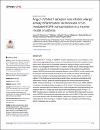Ang-(1-7)/ MAS1 receptor axis inhibits allergic airway inflammation via blockade of Src-mediated EGFR transactivation in a murine model of asthma.

عرض / فتح
التاريخ
2019-11المؤلف
El-Hashim, Ahmed ZKhajah, Maitham A
Babyson, Rhema S
Renno, Waleed M
Ezeamuzie, Charles I
Benter, Ibrahim F
Akhtar, Saghir
...show more authors ...show less authors
البيانات الوصفية
عرض كامل للتسجيلةالملخص
The angiotensin-(1-7) [Ang-(1-7)]/MAS1 receptor signaling axis is a key endogenous anti-inflammatory signaling pathway. However, the mechanisms by which its mediates the anti-inflammatory effects are not completely understood. Using an allergic murine model of asthma, we investigated whether Ang-1(1-7)/MAS1 receptor axis a): inhibits allergic inflammation via modulation of Src-dependent transactivation of the epidermal growth factor receptor (EGFR) and downstream signaling effectors such as ERK1/2, and b): directly inhibits neutrophil and/or eosinophil chemotaxis ex vivo. Ovalbumin (OVA)-induced allergic inflammation resulted in increased phosphorylation of Src kinase, EGFR, and ERK1/2. In addition, OVA challenge increased airway cellular influx, perivascular and peribronchial inflammation, fibrosis, goblet cell hyper/metaplasia and airway hyperresponsiveness (AHR). Treatment with Ang-(1-7) inhibited phosphorylation of Src kinase, EGFR, ERK1/2, the cellular and histopathological changes and AHR. Ang-(1-7) treatment also inhibited neutrophil and eosinophil chemotaxis ex vivo. These changes were reversed following pre-treatment with A779. These data show that the anti-inflammatory actions of Ang-(1-7)/ MAS1 receptor axis are mediated, at least in part, via inhibition of Src-dependent transactivation of EGFR and downstream signaling molecules such as ERK1/2. This study therefore shows that inhibition of the Src/EGRF/ERK1/2 dependent signaling pathway is one of the mechanisms by which the Ang-(1-7)/ MAS1 receptor axis mediates it anti-inflammatory effects in diseases such as asthma.
المجموعات
- أبحاث الطب [1821 items ]

